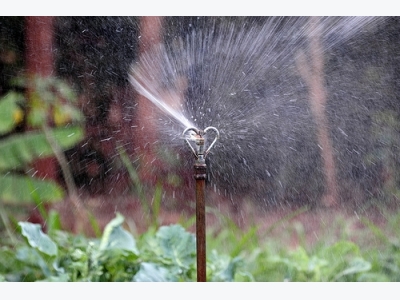New technology extracts drinking water and crop fertiliser from air

Since 2015, J-WAFS has supported a number of research projects to improve food and water safety and security. (Image source: CIAT/Flickr)
The Abdul Latif Jameel World Water and Food Security Lab (J-WAFS) at the Massachusetts Institute of Technology (MIT) is funding new research into harvesting water from air and technology that enhances crop production
Seven new projects are being supported by J-WAFS this year, and two notable initiatives include harvesting water from air – developing technology that can be used to extract clean, fresh water from the air using a specialised porous material and enhancing crop production – creating a solar-powered device to convert atmospheric nitrogen, water and sunlight into ammonia, which can be added to soil to promote plant growth.
As part of the harvesting water from air project, Mircea Dinca, associate professor of chemistry, and Evelyn Wang, Gail E Kendall Associate Professor in the Department of Mechanical Engineering, are teaming up to create a passive solar device that can extract water from the air at any range of humidity, using a metal-organic framework (MOF), a specialised porous material. J-WAFS seed funding will support the development of MOFs that can be used for providing water to remote areas, with greatly reduced infrastructure costs.
“We must continue to advance innovations and creative ideas for delivering safe and secure food and clean and renewable water supplies. Through the innovative technologies and collaborations we are supporting with these new research projects, J-WAFS is working to secure the future of our communities, the sustainability of our cities, and the prosperity of our economies in the face of rising population, greater urbanisation, and changing climate,” said John Lienhard, the Abdul Latif Jameel Professor of Water and Food at MIT.
Co-founded in 2014 by Community Jameel and MIT, J-WAFS is an initiative to coordinate and promote research related to water and food safety and security that will have a positive impact on communities in a rapidly changing world with expanding population.
Related news
 Cashew production forecast to drop nearly 20 percent in 2017
Cashew production forecast to drop nearly 20 percent in 2017 Vietnam is expected to harvest only 0.87 tonnes of cashew nuts per ha in 2017, 0.21 tonnes or nearly 20 percent less than 2016’s output per ha
 Bottlenecks in rice production chain affecting market share
Bottlenecks in rice production chain affecting market share Vietnam’s rice production is meeting difficulties because of two bottlenecks at the ends of the production chain, leading to a decline in market share.
 As Chinese stop importing fruit, farmers look to domestic market
As Chinese stop importing fruit, farmers look to domestic market As many Vietnamese farmers are reliant on the Chinese market, they have suffered as Chinese traders have reduced fruit imports.